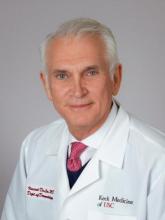Nutrient deficiencies present clinically in the skin, hair, and nails. Dr. Vincent DeLeo talks to Dr. Bridget Shields about the dermatologist’s role in managing nutritional dermatoses in hospitalized patients. “As dermatologists, we’re trained to recognize subtle detail, and we may be the first or really the only physicians to pick up on the seemingly minor cutaneous manifestations of underlying nutritional disease,” Dr. Shields explains. She highlights key nutrient deficiencies and risk factors that dermatologists may routinely encounter.
* * *
This week in Dermatology News:
- Lifestyle changes may explain skin lesions in pandemic era patients
- Study highlights benefits of integrating dermatology into oncology centers
- Republican or Democrat, Americans vote for face masks
* * *
Key takeaways from this episode:
- Undernutrition in hospitalized patients is relatively common but often goes unrecognized because it may develop slowly over months to years. “Early identification and treatment of nutritional deficiencies can drastically improve patient morbidity and mortality and decrease systemwide health care costs,” Dr. Shields explains.
- It can be easier for dermatologists to diagnose and screen for nutrient deficiencies if they are able to identify at-risk patients. “Some really common medical conditions serve as risk factors that I think we routinely overlook as providers,” Dr. Shields notes.
- Dietary habits can predispose patients to nutrient deficiencies and therefore should be included as part of the patient’s history.
- The oral mucosa can provide important insight into a patient’s underlying metabolic and overall systemic health.
- Hospitalized patients often take in less calorically than they do at baseline. “I think working with a nutritionist can be really important to ensure a patient has appropriate macro- and micronutrient composition of any supplementation provided,” notes Dr. Shields.
- In most cases, treating the underlying nutrient deficiency will simultaneously treat the associated cutaneous manifestations.
- Skin-directed topical therapies can be useful in the right context but should not be used alone without the associated nutrient supplementation.
- More research is needed on how nutritional manipulation may impact the skin and serve as an adjunct to therapy with more traditional medication regimens.
Hosts: Nick Andrews; Vincent A. DeLeo, MD (Keck School of Medicine of the University of Southern California, Los Angeles)
Guest: Bridget E. Shields, MD (University of Pennsylvania Perelman School of Medicine, Philadelphia)
Disclosures: Dr. DeLeo is a consultant for Esteé Lauder. Dr. Shields reports no conflict of interest.
Show notes by: Alicia Sonners, Melissa Sears
* * *
You can find more of our podcasts at http://www.mdedge.com/podcasts
Email the show: podcasts@mdedge.com
Interact with us on Twitter: @MDedgeDerm

